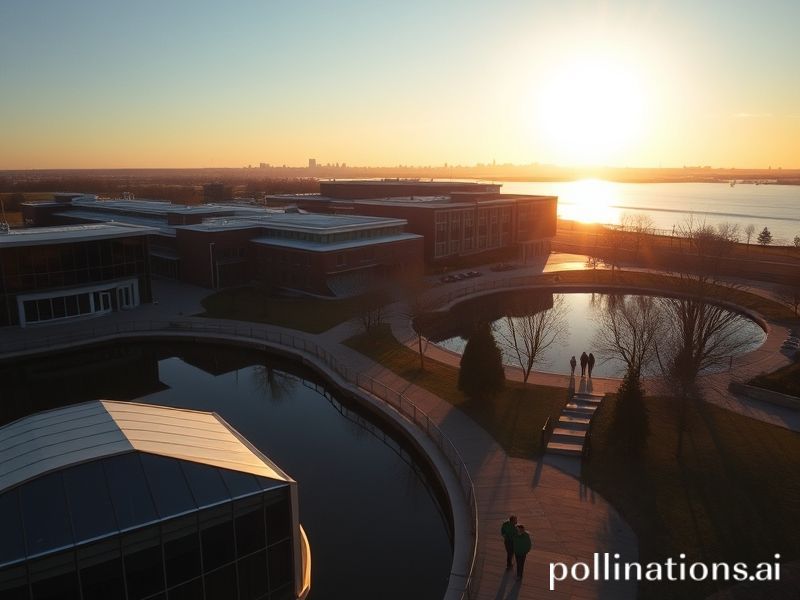Stockton University: Where Global Problems Major in Coastal Irony
Stockton University: A Quaint American Campus Where the World’s Problems Go for a Gap Year
By Our Correspondent Who Still Owes the Bursar
GALLOWAY, New Jersey—Somewhere between the Pine Barrens and the existential dread of late-stage capitalism sits Stockton University, a 2,000-acre arboretum of contradictions. To the average European it looks like a polite Scandinavian suburb accidentally dropped on the Jersey Turnpike; to the average Asian parent it resembles a very expensive summer camp that forgot to issue report cards; to the average hedge-fund algorithm it is simply “undervalued real-estate adjacent to coastline.” All three impressions are, in their own tragicomic ways, perfectly correct.
Stockton is what happens when America tries to build a liberal-arts utopia on top of a swamp and then wonders why tuition keeps sinking. Founded in 1969—coincidentally the same year humanity began to suspect the planet might be perishable—the university was christened after Richard Stockton, a signatory of the Declaration of Independence who was later tortured by the British and had his estate burned. This detail is cheerfully omitted from the admissions brochures, perhaps because it cuts a little too close to the modern American collegiate experience: sign up for enlightenment, leave with scorched earth and a Spotify playlist of trauma.
Globally speaking, Stockton is a microcosm of the West’s attempt to export the boutique university model. The campus now hosts satellite partnerships from China to Mauritius, because nothing says “authentic New Jersey” like a lecture hall in Port Louis. International enrollment has doubled in five years, driven by students who believe a “coastal” American degree will catapult them into the transnational managerial class. Instead they discover that “coastal” here refers mostly to the smell of pre-torn seaweed and the faint sound of Atlantic City slot machines coughing up nickels in the distance.
The curriculum itself reads like a fever dream drafted by a UN subcommittee on buzzwords: Sustainability Studies rubbing shoulders with Esports Management, Holocaust & Genocide Studies sharing a hallway with Tourism & Hospitality—because apparently we can genocide in the morning and sell package tours by dusk. Professors, many hired during the Great Adjunctification of 2011-2021, now compete for “micro-credentials” and “digital badges,” which is academic speak for “please clap.” Their research output ranges from groundbreaking climate-resilience mapping to peer-reviewed TikToks on coastal erosion, the latter funded by a grant that also paid for an inflatable shark named “Finley” to raise awareness. Somewhere, a Danish climate minister is weeping into a Tuborg.
Yet for all the mockery, Stockton has become an unlikely bellwether. When the pandemic struck, it spun up its own PCR lab faster than most G7 nations, proving that any institution with parking lots can pivot to virology if the grant money is right. Its experimental liberal-arts-meets-STEM “holistic nursing” program now exports graduates to Dubai, where they soothe the anxieties of crypto-millionaires whose portfolios are hemorrhaging. Meanwhile, the campus police department quietly purchased a military-surplus MRAP “for hurricane evacuations,” a phrase that translates across every language as “we expect the worst and have given up pretending otherwise.”
And so the world watches Stockton the way one watches a slightly drunk friend trying to parallel-park: wincing, yet unable to look away. The university’s strategic plan pledges “carbon neutrality by 2035,” which is exactly 14 years after the surrounding barrier islands are projected to become submarine reefs. It boasts of “inclusive excellence,” a term coined by a committee that clearly never met the campus geese, those fascist waterfowl who will mug you for a bagel and then file an incident report. In the bookstore, a hoodie reads “Stockton University: Be the Change,” stitched by workers whose own hourly wage wouldn’t cover the sales tax on the hoodie itself. Irony, like the coastal fog, rolls in daily.
Still, there is something perversely admirable about a place so unabashedly mid-tier that it becomes avant-garde. In an era when Oxford sells its soul to oil sheikhs and the Sorbonne rents its name to Saudi start-ups, Stockton’s earnest mediocrity feels almost radical. It is the last university that still believes in general education, the last campus where the dean personally emails you about mental health, the last swamp in America not yet rebranded as a “blue-carbon sequestration zone.”
One day, when the rising tides finally breach the dorms, archaeologists will sift through the silt and find biodegradable commencement caps, vape cartridges, and one pristine lacrosse stick. They will wonder what rituals were performed here, what cargo cult worshipped at the altar of “experiential learning.” And perhaps they will conclude—correctly—that Stockton was not merely a university but a controlled experiment in late-imperial optimism, a place where the world’s problems enrolled for four years, pledged a fraternity, and graduated summa cum student-loan debt into the waiting maw of history.
Until then, the geese remain in charge.







